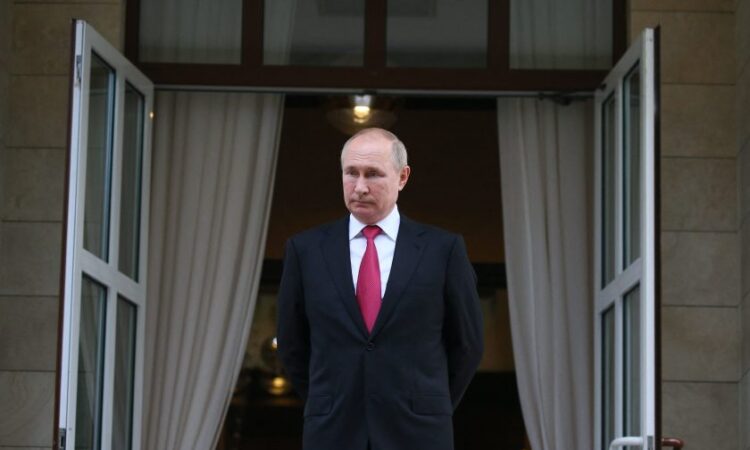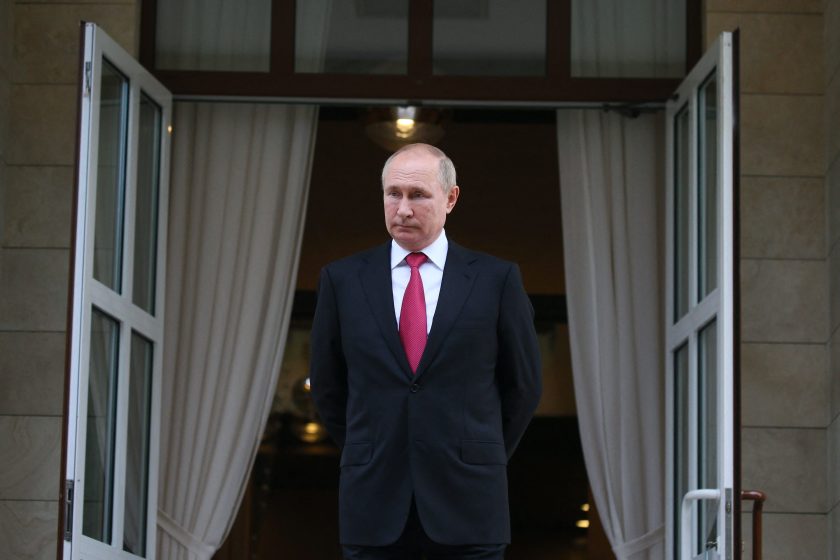

Russia invaded Ukraine nearly two years ago. If not for the war, Russia’s GDP could have been 5% bigger, the U.S. Treasury estimates. VLADIMIR SMIRNOV—AFP/Getty Images
Vladimir Putin’s invasion of Ukraine is nearing the two-year mark. In the time that’s passed, Russia has lost out on economic growth as it remains under pressure inside and out.
If not for the Ukraine war, Russia’s GDP could have been 5% bigger, according to U.S. Treasury estimates cited by the Financial Times Thursday.
Following the invasion, Moscow’s policy response and sanctions from the U.S. and its allies have put its “economy under considerable economic strain,” said Rachel Lyngaas, the Treasury Department’s chief sanctions economist.
Among the ripple effects of Putin’s invasion on the economy are the “rapidly growing expenditures, a depreciating ruble, increasing inflation, and a tight labor market reflecting a loss of workers,” Lyngaas wrote in a draft memo assessing the financial impact of the Ukraine war, viewed by the FT.
Russia has been under a long list of additional sanctions from the U.S. and the European Union since the invasion last March, making it the most sanctioned country in the world. Even under intense economic pressure, the country has committed big sums of money to defense—about 6% of its GDP for 2024, compared with 3.9% in 2023. By comparison, the U.K. spent 2.2% of its GDP on military expenditures in 2022, while the U.S. spent 3.5%.
Other concerns highlighted by Treasury include inflation that’s nearly double the central bank’s 4% target rate and record-high emigration. The Russian economy is also lagging behind other energy exporters, including the U.S.
“Russia is now more isolated, relying on individuals and entities willing to resupply its military and perpetuate its heinous war against Ukraine,” Lyngaas wrote.
The memo comes just as the Biden administration warned that it would need tens of billions of dollars to continue providing support to Ukraine. Last week, congressional Republicans blocked a White House request for $61 billion to assist Kyiv’s efforts to fight Russia.
Questions over effectiveness of price cap, sanctions
Skeptics have raised concerns over whether Western sanctions and the price cap on oil and petroleum products is having the desired impact. The $60-per-barrel cap designed by Australia, the U.S., and other G7 nations was imposed last December with the goal of reducing Russia’s revenues from seaborne crude oil exports such that oil supply is maintained to ensure market stability while Russia is forced to sell at a steep discount. In the first nine months of 2023, oil and gas producers saw income shrink by 41%, pointing to lesser export volumes as was initially intended.
The sanctions, the EU said, have had “hard, tangible effects” that could hit Russia’s economy and its budget in the long term. It has also forecasted a decline in GDP growth for the current year given the impact of the war.
The U.S. Treasury said the cap “helped reduce Russia’s export earnings by forcing sizable discounts on Russian exporters where the embargo lowered demand.”
But in recent times, Russia has found ways around the price cap, and has charged well above the $60 benchmark as oil prices have risen. Putin also moved to ban exports of gasoline and diesel to keep inventories high and provide for the average Russian consumer as the war with Ukraine continues. Even though the Russian ruble has fallen to staggering lows this year, the economy has managed to march on.
For their part, Russian authorities have argued that the economy has remained robust despite economic sanctions and the additional financial burden from the war. In the third quarter, Russia’s GDP grew 5.5% compared with the same period last year, according to the state statistics department Rosstat, putting it on track to recover from its 2022 GDP drop of 2.2%.
Putin recently applauded Russia for staying strong despite being isolated by the West and transforming into a “growth center of the new global economy.” The Kremlin has hailed other victories including low unemployment and an increase in average income.
Western sanctions could have a more staggered effect over time as it begins to trickle down to the everyday life of Russians and their cost of living. The Treasury Department introduced a fresh round of sanctions on Tuesday, targeted at companies in Turkey, the UAE, and China that are believed to be helping Russia gain access to technologies.
Representatives from the U.S. Treasury Department didn’t immediately return Fortune’s request for comment.






